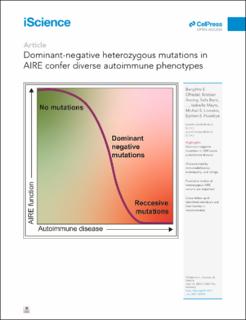Dominant-negative heterozygous mutations in AIRE confer diverse autoimmune phenotypes
Oftedal, Bergithe Eikeland; Assing, Kristian; Baris, Safa; Safgren, Stephanie L.; Johansen, Isik S.; Jakobsen, Marianne Antonius; Babovic-Vuksanovic, Dusica; Agre, Katherine; Klee, Eric W.; Majcic, Emina; Ferré, Elise M.N.; Schmitt, Monica M.; DiMaggio, Tom; Rosen, Lindsey B.; Rahman, Muhammad; Chrysis, Dionisios; Giannakopoulos, Aristeidis; Garcia, Maria Tallon; González-Granado, Luis Ignacio; Stanley, Katherine; Galant-Swafford, Jessica; Suwannarat, Pim; Meyts, Isabelle; Lionakis, Michail S.; Husebye, Eystein Sverre
Journal article, Peer reviewed
Published version

Åpne
Permanent lenke
https://hdl.handle.net/11250/3091359Utgivelsesdato
2023Metadata
Vis full innførselSamlinger
- Department of Clinical Science [2318]
- Registrations from Cristin [9791]
Sammendrag
Autoimmune polyendocrine syndrome type 1 (APS-1) is an autosomal recessive disease characterized by severe and childhood onset organ-specific autoimmunity caused by mutations in the autoimmune regulator (AIRE) gene. More recently, dominant-negative mutations within the PHD1, PHD2, and SAND domains have been associated with an incompletely penetrant milder phenotype with later onset familial clustering, often masquerading as organ-specific autoimmunity. Patients with immunodeficiencies or autoimmunity where genetic analyses revealed heterozygous AIRE mutations were included in the study and the dominant-negative effects of the AIRE mutations were functionally assessed in vitro. We here report additional families with phenotypes ranging from immunodeficiency, enteropathy, and vitiligo to asymptomatic carrier status. APS-1-specific autoantibodies can hint to the presence of these pathogenic AIRE variants although their absence does not rule out their presence. Our findings suggest functional studies of heterozygous AIRE variants and close follow-up of identified individuals and their families.
